NPS Website; Local Website; Another Local Website
WHAT IS IT?
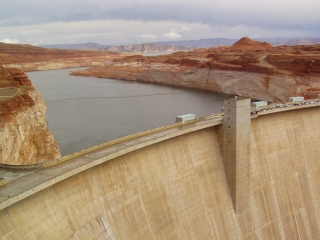
The Site consists mostly of the massive Lake Powell, the second largest man-made lake in the United States. The Federal Government created Lake Powell by damming the Colorado River with the Glen Canyon Dam. Lake Powell is 186 miles long. The Dam is marked as Mile 0. You can access the Lake at one point in Arizona at Mile 1 (one mile north of the dam). You can access the Lake at three points in Utah, at Miles 92, 96 and 139. Because of the limited access, we have broken up our reviews into an Arizona portion and a Utah portion.
The Arizona section includes only a small section of Lake Powell as the state border stands at Mile 13. This review includes the Glen Canyon Dam and undammed parts of the Colorado River to the south, including Marble Canyon, the Navajo Bridge and the historical river crossing at Lee’s Ferry.
BEAUTY (8/10)
The brochure quotes Colorado River explorer John Wesley Powell on the Glen Canyon, “(the Canyon is) a curious ensemble of wonderful features.” He is not wrong. The Vermillion Cliffs, the dramatic buttes and the painted mesas still astound. Of course, we will never see the Glen Canyon as Powell did. His namesake artificial Lake has changed the land forever. The beauty has not disappeared; it has just changed.
HISTORICAL INTEREST (8/10)
Many National Park Service sites highlight infamous incidents in American history. Glen Canyon NRA is no exception. Except that in Glen Canyon’s case, the NPS does not address the history, ignoring that there was any controversy at all.
The Glen Canyon Dam was the last dam built in the United States; construction started in 1956. The lake it created covered thousands of acres of irreplaceable canyon scenery, flooded prehistoric cave dwellings, washed away petroglyphs and made sacred Indian land inaccessible. The Dam has spawned numerous lawsuits, protests and anger. Its building is often cited as the birth of the modern-day environmental movement.
Neither the Glen Canyon Museum nor the guided tour mentions any problems regarding the Dam. No discussion of the growing movement to drain the Dam. To be fair, Michael’s questions about the Dam’s other history were answered frankly and with great depth by the Tour Guide. If you are not familiar with the area’s history, you are led to believe that you’re visiting just another Bureau of Reclamation project.
The Park also glances over the Mountain Meadows Massacre perpetrated by the Lees Ferry boat operator, John D. Lee. We would have loved to learn more about this forgotten episode in western History.
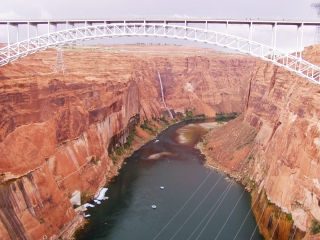 CROWDS (4/10)
CROWDS (4/10)The once-an-hour free tour of Glen Canyon Dam is a popular tourist attraction and tour groups are limited to 20. We arrived on a Tuesday but the last three tours of the day had already been filled. We booked a spot on the first Wednesday excursion. In that sense, the crowds had a negative effect on our visit.
Our tour group consisted of mostly retirees. Their esoteric questions regarding the Dam’s construction led us to believe that many had been engineers or construction foremen. No one asked about the environmental impact and all failed to hear our guide’s repeated statements that the dam no longer produces much energy at all. They kept asking who gets the energy and what would Las Vegas do if the dam shut down and our guide kept responding that coal plants provide all the area power; the Dam’s main use is just water storage for local farmers.
Busloads of tourists meander around the Dam Visitor Center parking lot and along the Glen Canyon Bridge, the second highest steel arch bridge in the world. Only the New River Gorge Bridge in West Virginia is higher. (We were there just a few months ago! Its heights are much scarier.) Be careful and drive slowly. The tourists walk as if they are in an area without vehicular traffic.
EASE OF USE/ACCESS (1/5)
Humans have inhabited this area for nearly 12,000 years. The Colorado River has forever been a highly effective barrier to travel. There are three River/Lake crossings in the Park. Utah Route 95 crosses at the Mile 140 mark in the northeast. The next crossing is in Moab, some 70 miles upstream as the raven flies or 150 miles by road.
The next time the Lake is crossed is at the Glen Canyon Dam, 140 miles southwest on the River but 230 miles by car. The Lees Ferry crossing is only about 5 miles downstream but is a 45 mile vehicular detour. The Colorado then forms the Grand Canyon and weaves nearly 300 miles until the next crossing, the Hoover Dam near Las Vegas. The car distance from Page to Las Vegas, 351 miles. Amazingly, these are the same River crossings that have existed for thousands of years.
It is not easy to get to Page, Arizona, but it does sit at the pivot point on a U.S. Route right angle between Interstates 40 and 15. I-40 and Flagstaff, Arizona is 135 miles to the south and I-15 and St. George, Utah is 135 due west.
The Glen Canyon NRA can easily fit on your itinerary if you are traveling the Grand Circle of southwestern National Parks. You have to cross the Colorado and odds are it is going to be through the Park. In addition, you must pass through Lees Ferry if you are driving from the Grand Canyon North Rim to the South Rim. Lees Ferry is also the launch point for all white water excursions down the Grand Canyon.
CONCESSIONS/BOOKSTORE (3/5)
Prior to entry, Michael claimed that if the bookstore had Paul Auster’s Moon Palace this rating would automatically be a 5. Glen Canyon Dam plays a big role in the Brooklyn author’s book, believe it or not. But alas, it wasn’t there.
The selection was average. Lots of Grand Canyon/Colorado Plateau stuff but very little about the environmental impact of the dam or the history behind its construction.
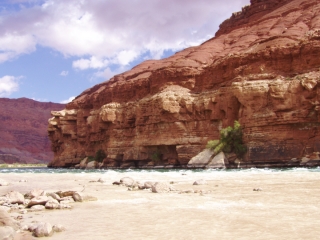 COSTS (3/5)
COSTS (3/5)Entrance costs $10 per vehicle. We are unsure where these fees would be collected. We encountered no fee requests at Glen Canyon Dam, Lees Ferry or Navajo Bridge. We think that the $10 entrance fee applies only to boaters wishing to use the Lake. The $10 entrance fee is waived if you have a National Parks Pass.
The 40-minute guided tour of Glen Canyon Dam is free. Just be sure to sign up early or make reservations ahead of time by phone. Tours fill up quickly.
There is a $10 boat launch fee if water recreation is your thing (and you own a motor boat). Once your out, lakeshore camping is free. There are two official campgrounds in the South, at Lees Ferry ($10 per site) and Lone Rock ($6 per site).
RANGER/GUIDE TO TOURIST RATIO (3/5)
The Glen Canyon Dam offers free hourly tours and limits the tour size to 20. Hired Dam employees give the tours rather than Rangers. We have no quibbles here; the guides do a terrific job and give the visitors a great deal of attention. Then again, so did the Security Guard assigned to our Tour Group.
We encountered one surly Ranger at the Dam. Or maybe we were the ornery ones once we realized the logistical nightmare of reaching Rainbow Bridge NM located at Mile 49 of Lake Powell. Here are our choices: 1) $110 per person boat cruise or 2) 36-mile round trip hike through the desert. The trailhead lies at the end of a 30-mile unpaved road. 4x4 or high clearance vehicle necessary. Who knows how we will ever get to that place.
There were no Rangers at the Navajo Bridge Interpretive Center or the Lees Ferry Ranger Station. We fruitlessly returned (on two different days) to the unmanned and locked Ranger station at Lees Ferry hoping to get an elusive National Parks Passport Stamp. We are such nerds.
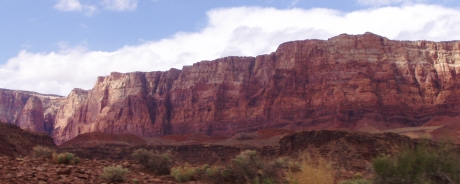 TOURS/CLASSES (6/10)
TOURS/CLASSES (6/10)The Dam is the only developed portion of the Glen Canyon NRA. There is a small indoor exhibit next to the Navajo Bridge as well as bulletin boards, placards and a mimeographed walking tour pamphlet near the riverbank of Lees Ferry. The only organized tour options take place and involve the Dam.
Glen Canyon Dam is a high security area. Metal detectors frame the doorways to its Visitor Center. Visitors are allowed to carry only their camera and wallet; no purses or bags of any kind. Once through the security checkpoint, you have access to the bookstore, amphitheatre, multimedia exhibit and information desk where you can sign up for a free tour.
The excellent tour focuses on the logistics of the Dam – how it works, how it was built and its many functions. It was perfectly catered to the audience and their interests in addition to being surprisingly in-depth. Michael probed the guide for more answers and opinions around the notorious construction of the Dam, local viewpoints of the situation and future plans. Our young tour guide ably responded to each of his inquiries, usually offering more than one point of view. He was refreshingly honest and was able to knowledgably stray from a set script.
One can take a self-guided walking tour of the historic dirt street of Lees Ferry. The absence of Rangers and the lengthy dirt road we needed to take to get to it were effective deterrents. We spent our time at Lees Ferry staring enviously at the few boats and rafts packing up and getting ready to set off down the Colorado River.
FUN (6/10)
Michael delighted in getting such an up close and personal view of one of the world’s most famous dams. We wish we had more time to spend with our tour guide but his schedule and the day’s full set of tours did not allow it. Just getting from one place to the next was more enjoyable than usual – vermillion cliffs, dry Arizona landscapes that change colors with the sun and glimpses of the winding Colorado River gave us new things to look at and made us uncontrollably excited for our next destination, the Grand Canyon.
While it includes boat launches into both Lake Powell to the north and the Colorado River to the south, the Arizona portion of Glen Canyon NRA fun rating does not take boating into account – only the dam, the historical sites and the beautiful Arizona scenery.
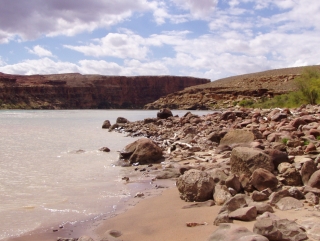 WOULD WE RECOMMEND? (6/10)
WOULD WE RECOMMEND? (6/10)Glen Canyon NRA is hardly user-friendly. Access to the Colorado River is extremely limited and security at the Dam is tight. Staffing at Lees Ferry and Navajo Bridge is beyond minimal. The free tour of the Glen Canyon Dam was a treat for an American Studies major like Michael. He may have even forgotten that he was angry at Gab for making us miss the prior day’s tour.
TOTAL 48/80
www.usa-c2c.com
© 2004-06